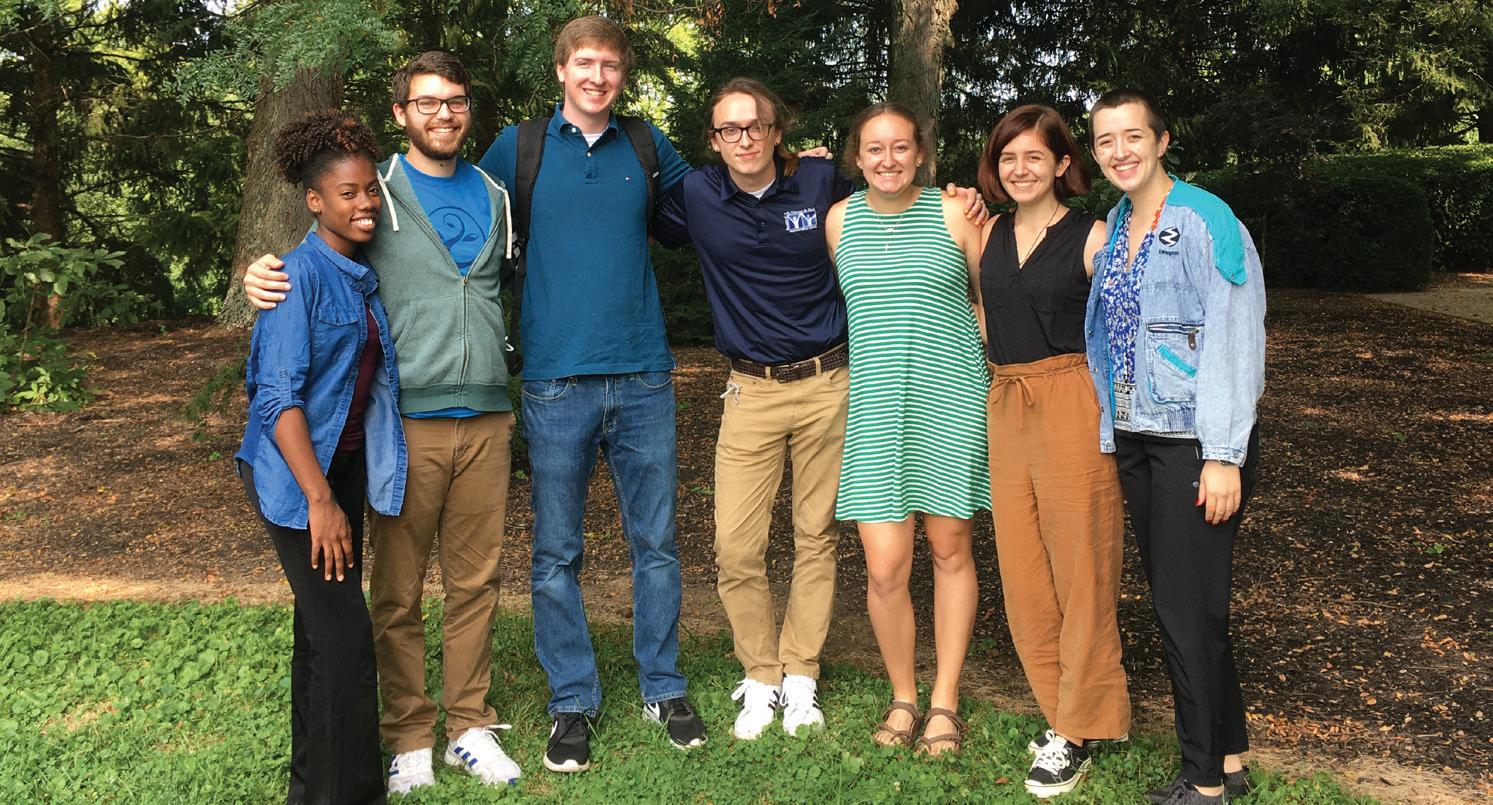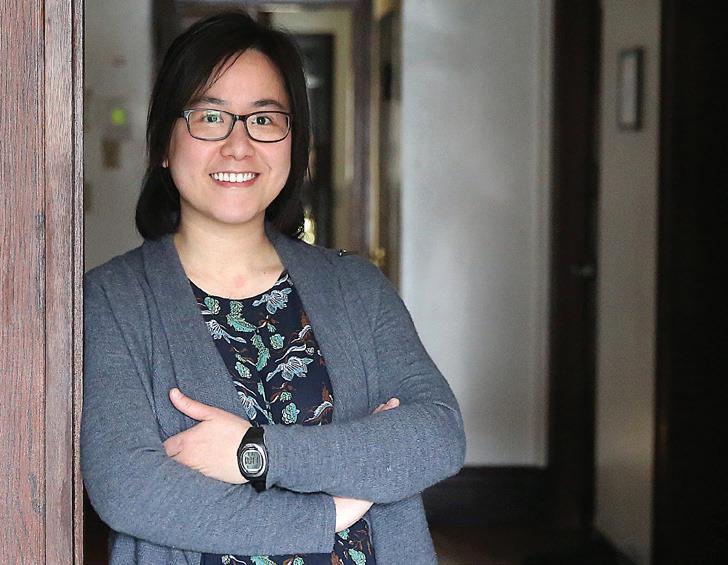
5 minute read
A YEAR TO REMEMBER
Hannah Broermann was laser focused when she enrolled at Mount St. Joseph University in the fall of 2016. Academics were her first priority, of course. After that, it was athletics. She was a two-sport athlete—tennis and softball—so there wasn’t going to be time for anything else. No extra-curricular activities, no sororities, no organizations.
So during her orientation, when she was led into the cafeteria that was filled with groups and clubs and ways to get involved, she wasn’t sure she needed to be there. She also wasn’t sure why she stopped in front of the campus ministry table, where Charissa Qiu was standing.
“It was totally different,” Hannah says. “Everyone else wanted to tell me about their group. Charissa wanted to talk about me, about who I was and what my interests were.” Maybe it was providence. Who knows? They exchanged information and Hannah went back to books and sports. Three months later, her phone rang. It was Charissa. She was leading a mission trip to New Orleans and was calling to see if Hannah wanted to go. She did.
During the trip, they talked about a lot of things—college, sports, life. Charissa mentioned her own career path, which included a year of service through St. Vincent de Paul’s Vincentian Volunteers of Cincinnati (VVC) program. It was a casual mention, but for some reason it left an imprint on Hannah. She filed it in the back of her mind and kept marching on.
Tennis continued nonstop—on both the men’s and women’s teams—but softball got dropped to make way for student teaching and an internship with St. Vincent de Paul. College life was progressing and graduation was growing near. Then, once again, her phone rang. It was Charissa. She recently became manager of the VVC program—the same program she went through at the end of her college career—and was calling to see if Hannah was interested in following in her footsteps and participating in a year of service after graduation. She thought about it and then nodded. She was.

Via Zoom, the VVCs learned about the history of the VVC program and how it came to be from the creators of the program, Maura Carinello and Alison Zlatic.

Members of the VVC Cohort '20-'21
Conversations turned into commitments, and Hannah became the first person to agree to join this year’s VVC cohort. Under normal circumstances, it takes a special soul to agree to commit a year to serving others, says Charissa, especially with pressure to find a job or enter grad school. Yet Hannah and six other young adults, Presley, Eddie, Nicolette, Aaron, Ruthey, and Conner, made the brave commitment to become VVCs this year, despite the additional challenge of doing so under an umbrella of uncertainty and confinement brought on by the pandemic.
“Every group of VVCs is unique,” says Charissa. “They all have different experiences. But this group has the added dimension of the pandemic. What I’m trying to do is not look at it as a challenge, but as an opportunity. This pandemic is going to be a historical event, just like 9/11. You are going to look back and ask what were you doing at that time? This group will remember this year. They will remember the people they walked through the year with. People’s social circles have been minimized, so when this group thinks back to what they were doing in 2020, they will think of each other, and that is something that will connect them throughout their lives.”
Yes, she admits, there has been some rearranging of plans and scrambling to come up with a Plan B for a number of events. Formation and training activities that typically take place in the community have been cancelled. They’ve missed out on social events, festivals and gatherings, such as the Labor Day fireworks on the riverfront that other VVC cohorts have enjoyed. In their place, they’ve huddled inside, watching movies, playing board games or reading.
“It’s given us the opportunity to be closer,” says Hannah.
It’s also given them the chance to expand their learning options.
“Since so many events are now being held virtually, we’ve been able to expand the events we can participate in,” says Charissa. “We attended the International Human Trafficking and Social Justice Conference this year because it was virtual. In the past, we would not have had the travel budget to attend something like that.”
Reflecting on social justice issues, both locally and nationally, is part of the overall VVC experience, along with serving neighbors through full-time roles at St. Vincent de Paul’s Neyer Outreach Center and through involvement in a St. Vincent de Paul Conference. The VVC program intends to help participants live in faith, grow in friendship and serve in solidarity throughout the 11-month term.
VVCs live together in the Kohler- Hubert House, a West End home owned by St. Vincent de Paul, just blocks from the Neyer Outreach Center. They create an intentional living community, sharing chores, groceries, meals and quality time. VVCs earn modest living stipends and receive health insurance, as well as bus passes and cell phone stipends. But they do agree to live on the margins. They apply for food stamps when they arrive in August, and learn the ins-and-outs of the assistance arena, just like many of the neighbors served by St. Vincent de Paul. They learn how to navigate the bus system to get wherever they need to go, and where free events and activities are.
Overall, it helps them better understand the people who visit St. Vincent de Paul seeking help. It also stretches and grows them personally, helping them see others differently and gives them a different perspective on life, work and the world.
But it isn’t easy. And finding those special souls for next year’s VVC cohort is going to be a challenge, says Charissa, since all in-person college recruiting efforts have been cancelled. Like everything else, recruiting has gone virtual.
She shrugs. It gives her a chance to have a presence at places she might not have gotten to, she says. “Besides,” she says. “At the end of the day, I think all of our efforts to find people or have them find us are dependent on providence.”

Carissa Qui, VVC Program Manager
If you know a young adult who you think would be interested in learning more about VVC, please contact Charissa Qiu at 513-562-8841 ext. 239.

